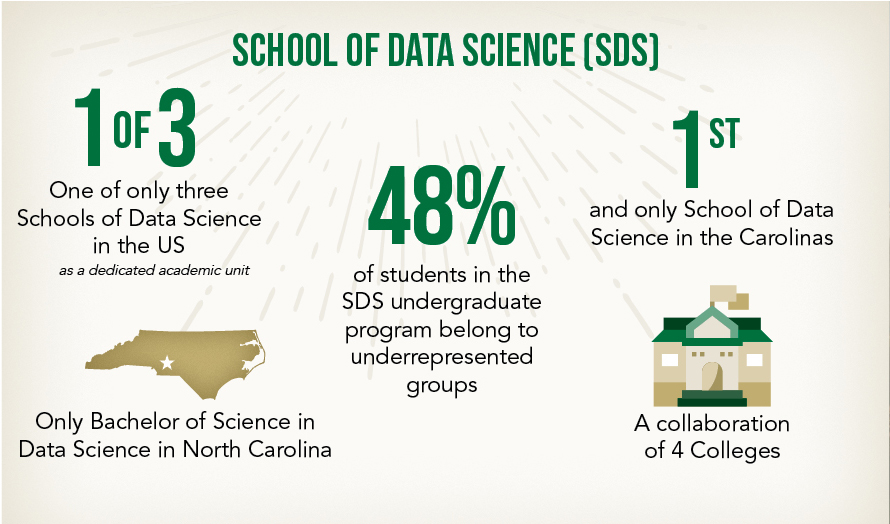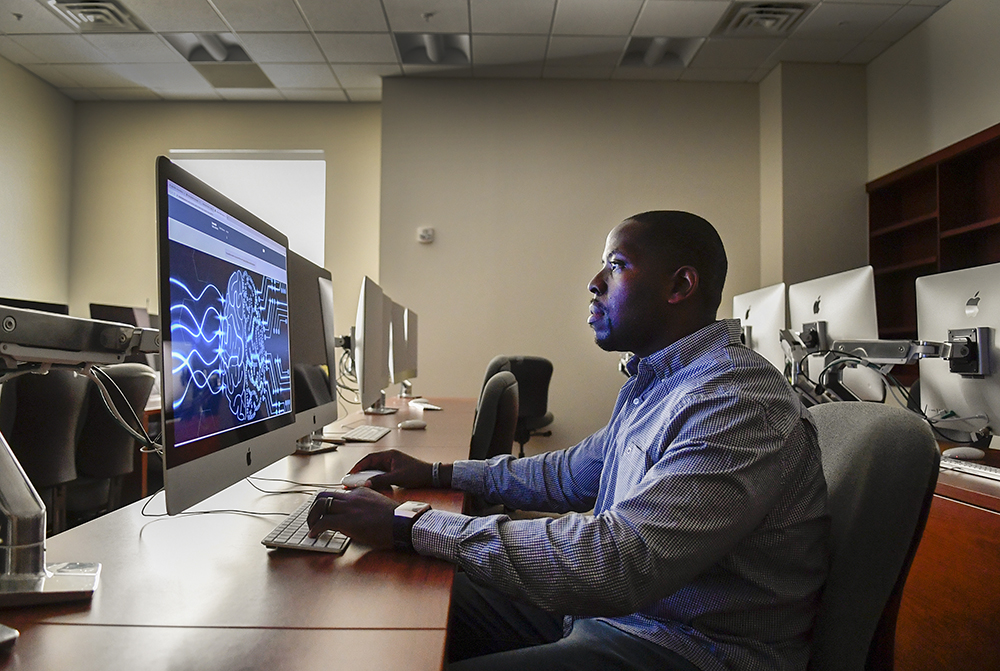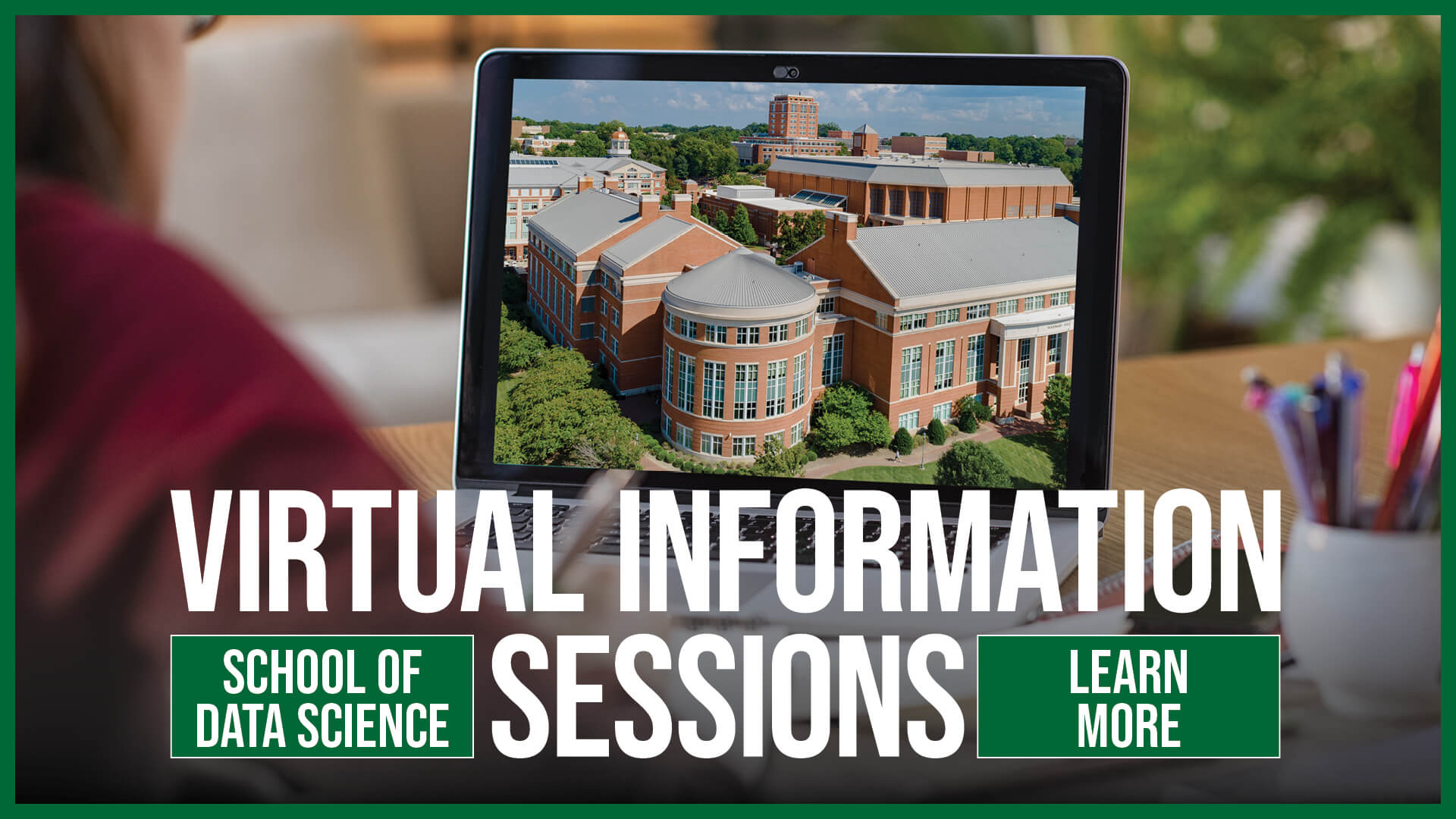Data science answers the call
Data Science answers the call
How UNC Charlotte is responding to industry demand in Charlotte, the region and beyond.How UNC Charlotte is responding to industry demand in Charlotte, the region and beyond.

Harnessing academic innovation and progressive collaboration, UNC Charlotte is meeting the demands of our nation’s workforce head on. With a record-breaking 30,000 students and counting, this growing research powerhouse is responsible for developing and educating the region’s most robust talent pipeline, creating real-world solutions for today’s evolving business and community needs.
Case in point: The UNC Charlotte School of Data Science (SDS). Data is everywhere. In fact, more data was generated in the last two years than throughout the preceding entirety of human history. This reality is helping to fuel one of the country’s most burgeoning and critically important industries — data science.
Recognizing the opportunity, UNC Charlotte launched the first School of Data Science in the Carolinas, tapping the region’s expansive ecosystem of research, industry and community engagement to apply a visionary lens to the education and application of data science. Bringing together brilliant minds through interdisciplinary partnership, the University is bridging the gap between society and technology through hands-on programming and research.

THE RUNDOWN ON DATA SCIENCE
Sorting through the data
While the driving force behind the data science revolution is the sheer amount of data being produced, at its core is the field’s desire to interpret and create meaning from data to spur innovation and inform decision making.
Why it's important
As institutions and organizations expand their analysis of data, the promise for data science is realized every day through innovation such as self-driving cars, new medical diagnoses and treatments, and more reliable weather forecasts. As society is learning, it is equally important to train a generation of professionals to engage in the larger ethical issues embedded in data science like the reinforcement of existing biases, lack of transparency in artificial intelligence, and data privacy and use.
The industry is booming
Since 2012, the field has created 8 million jobs in the United States alone and 6 million more worldwide. Glassdoor, a popular job site, rated data scientist as the No. 1 job in its annual list of 50 Best Jobs in America from 2016 to 2019.
Demand is outpacing supply
While industry growth is roaring, job demand still outpaces the supply of qualified professionals. In 2018, the United States experienced a shortage of 151,000 data scientists, a gap that is expected to jump to 250,000 by 2025.
Answering the call
In 2013, recognizing the vital role of data science to a number of disciplines and organizations, UNC Charlotte made it an institutional priority. What started as the Data Science Initiative has become the School of Data Science — the first and only academic unit of its kind in the Carolinas — which launched in early 2020.
Building the talent pipeline
Data science at UNC Charlotte earned the early support of regional business partners. Business leaders recognized the program established a talent pipeline for highly skilled data science professionals and served as an expert resource for continuing education and external research.
Top 3 Jobs in increasing demand
- Data analysts and scientists
- AI and machine learning specialists
- Big data specialists

Top 3 GROWING SKILLS, WORLDWIDE
- Analytical thinking and innovation
- Active learning and learning strategies
- Complex problem-solving
THE SCHOOL OF DATA SCIENCE AT A GLANCE
DEGREES OFFERED
The bachelor’s, master’s and graduate certificate programs teach skills in machine learning, data analysis, artificial intelligence, statistics, data visualization and the ethics surrounding the field of data science.
UNIQUE IN N.C.
The new bachelor’s degree in data science, announced in January 2021, is the only undergraduate data science program currently offered in North Carolina. It is designed to accommodate new and transfer students.
PARTNERSHIPS
A partnership with Wake Technical Community College provides a seamless transition for interested students.
DIVERSITY & INCLUSION
Placing an emphasis on diversity, 48% of enrolled undergraduate students in the School of Data Science belong to underrepresented groups.
TURNING NUMBERS INTO SOLUTIONS
HEALTHCARE
Blending health informatics and data visualization, a group of UNC Charlotte researchers analyzed publicly available COVID-19 data to produce this interactive dashboard to better understand the rapid spread of the virus.
POLITICS
Illustrating how data science impacts politics, political scientists used voting data to conclude how Judge Amy Coney Barrett’s confirmation might shift the Supreme Court ideologically. Their work was the focus of this Washington Post story.
STRENGTHENING COMMUNITY
Deploying state-of-the-art language processing techniques to string together data points, researchers are developing an easy-to-search hub where journalists, researchers, legislative staff members and ordinary citizens can discover information about community-specific issues, such as water quality, land use or the opioid crisis — and the policy decisions that shape them.
School of Data Science In the News
ICYMI: UNC Charlotte lecturer and alumna John Tobias was recently featured in a Boston Globe story about diversity in sports analytics.
Beyond traditional pathways
THE SCHOOL OF DATA SCIENCE:
Leverages its location in Charlotte — one of the nation’s fastest-growing cities — to foster engaged and strong community and corporate partnerships. Corporations such as Bank of America, Lowe’s Inc., Wells Fargo, TIAA and Microsoft, now more than ever, are relying on the School of Data Science to foster well-rounded leaders who are uniquely prepared to help drive data science innovation.
Brings academia and industry together to turn data into knowledge to address society’s most pressing issues. The initiative holds the promise of creating tools to understand and highlight misinformation in social media, develop models illustrating the disparate impacts of pandemics and advance remedies for longstanding city planning challenges — allowing students to make meaningful differences in their communities and society as a whole.
Represents a unique, dynamic collaboration among four academic colleges. The School is an industry-university-state partnership, led by the College of Computing and Informatics, the Belk College of Business, the College of Health and Human Services and the College of Liberal Arts and Sciences. This novel and hands-on programmatic approach allows the University to recognize the evolution of data science across multiple industries.
FROM THE SOURCE: ALUMNI IN ACTION
This is a great opportunity to really make a difference in the world. With the rapid development of COVID-19, we’ve been able to see how important the FDA is in drug development, approval, and risk management. The public needs the FDA, and I’m excited to be a part of it.
Stratifyd is a company with data science in our DNA. We were founded with a bold but simple mission to enable everyone within an organization to not only uncover but also understand the hidden stories within their data. This release of our next-gen platform is a giant leap in bringing to life our vision of putting the power of data science into the hands of business users.
Data scientists are using big data for machine learning algorithms capable of generating millions of therapeutic antibodies to find treatments for COVID-19 with a high probability of success. Conducting antibody discovery in a lab typically takes years; however, these algorithms identify antibodies that can fight against the virus in just a week.
WHAT’S NEXT?
The School of Data Science represents UNC Charlotte’s far-reaching commitment to data science research and academic programming. Over the next several years, University leaders aim to further expand interdisciplinary research and diversify funding for it, and continue to focus on enrollment — in terms of overall numbers and diversity. As data science continues to influence innovation and decision making in business, politics, education, science and more, the School of Data Science at UNC Charlotte is poised to keep pace with this dynamic industry while preparing future data scientists to lead it.


